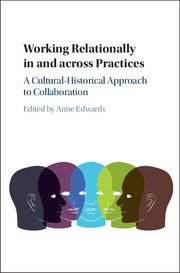Book contents
- Working Relationally In and Across Practices
- Working Relationally in and across Practices
- Copyright page
- Contents
- Notes on Contributors
- 1 Revealing Relational Work
- Part One Working Relationally in the Professions
- 2 Expertise, Learning and Agency in Partnership Practices in Services for Families with Young Children
- 3 Learning and Deploying Relational Agency in the Negotiation of Interprofessional Hierarchies in a UK Hospital
- 4 Relational Agency, Double Stimulation, and the Object of Activity: An Intervention Study in a Primary School
- 5 An Analysis of the Use of Relational Expertise, Relational Agency, and Common Knowledge among Newly Appointed Principals in Chile’s Public Schools
- 6 Building and Using Common Knowledge for Developing School–Community Links
- 7 Building Common Knowledge: Negotiating New Pedagogies in Higher Education in South Africa
- Part Two Working Relationally in Networks
- Part Three Working Relationally in Research
- Epilogue
- Index
- References
5 - An Analysis of the Use of Relational Expertise, Relational Agency, and Common Knowledge among Newly Appointed Principals in Chile’s Public Schools
from Part One - Working Relationally in the Professions
Published online by Cambridge University Press: 28 March 2017
- Working Relationally In and Across Practices
- Working Relationally in and across Practices
- Copyright page
- Contents
- Notes on Contributors
- 1 Revealing Relational Work
- Part One Working Relationally in the Professions
- 2 Expertise, Learning and Agency in Partnership Practices in Services for Families with Young Children
- 3 Learning and Deploying Relational Agency in the Negotiation of Interprofessional Hierarchies in a UK Hospital
- 4 Relational Agency, Double Stimulation, and the Object of Activity: An Intervention Study in a Primary School
- 5 An Analysis of the Use of Relational Expertise, Relational Agency, and Common Knowledge among Newly Appointed Principals in Chile’s Public Schools
- 6 Building and Using Common Knowledge for Developing School–Community Links
- 7 Building Common Knowledge: Negotiating New Pedagogies in Higher Education in South Africa
- Part Two Working Relationally in Networks
- Part Three Working Relationally in Research
- Epilogue
- Index
- References
- Type
- Chapter
- Information
- Working Relationally in and across PracticesA Cultural-Historical Approach to Collaboration, pp. 78 - 95Publisher: Cambridge University PressPrint publication year: 2017
References
- 1
- Cited by



